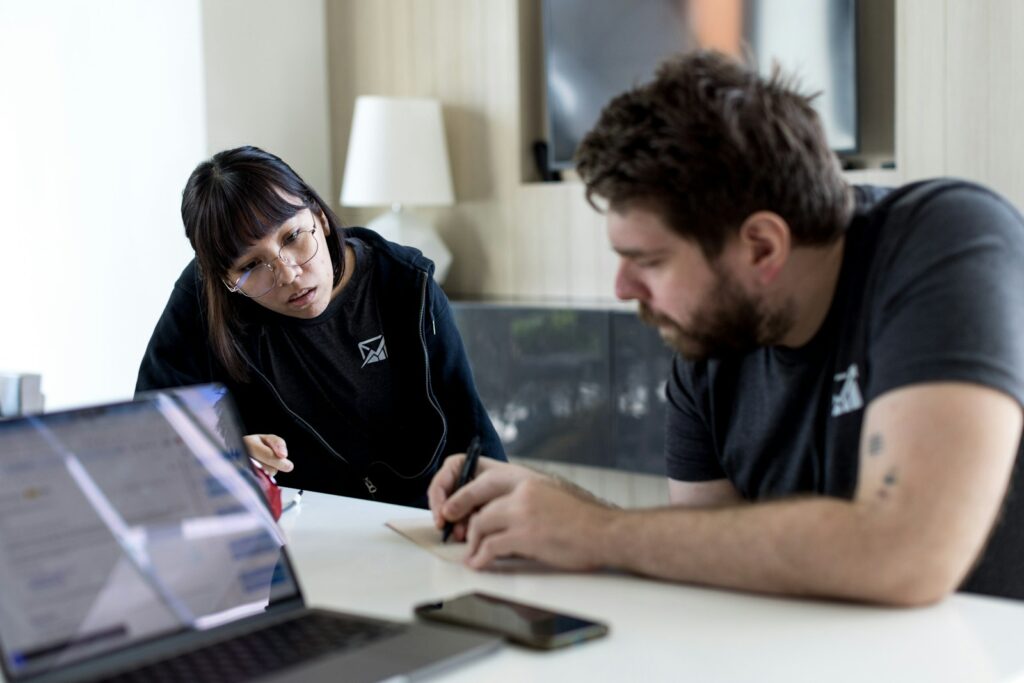
People get good at hiding what bothers them. Admitting insecurity feels too raw, so they find other ways to cope. Little behaviors that seem normal enough. Nobody really questions it. These habits layer up over time until they’re just part of who someone is. The original feeling that started it all gets buried under patterns that run on autopilot. Protection that no longer looks like protection.
Always Onto the Next Win

Rest feels wrong to certain people. They finish something and immediately need the next target. There’s always another project waiting. Sitting idle brings up feelings they’d rather avoid. A neighbor repaints rooms that don’t need it. The basement stores paint supplies that are barely used. Productivity becomes the escape route, and what looks like ambition is often just avoidance.
The Class Clown Defense

Watch how fast a joke can redirect a conversation. Things get real for a second, and humor steps in. The timing is perfect. Everyone laughs, and the moment passes. Being funny protects against being known. People don’t ask hard questions when they’re too busy being entertained. That guy who makes everyone laugh at parties drives home alone. The apartment stays quiet. Nobody’s around to see the difference between the performance and what’s left after.
Always Finding Fault in Others

Watch someone criticize everyone around them. They’ll notice every tiny flaw in how people dress, speak, or make decisions. It’s relentless. The judgment flows hardest right after their own failures. Tearing down others builds them up temporarily. A friend’s new haircut becomes fair game minutes after their own plans collapsed. Mirrors in their house go mostly ignored.
Never Having Enough Time

Busyness works as camouflage. The calendar stays packed with things that don’t necessarily matter but fill up space. Gaps in the schedule feel threatening. Sitting still means thinking, and thinking means feeling things that have been pushed down—three yoga classes, two book clubs, and volunteering every weekend. The couch at home collects dust because no one ever sits on it.
Bringing Up Important Names

Name-dropping isn’t about sharing stories. It’s about borrowing significance from other people’s accomplishments. Every conversation finds a way back to someone impressive they know. The connection gets mentioned even when it’s barely relevant. A person at dinner might reference their friend’s promotion twice before the appetizers arrive. Their own work email sits unopened on their phone.
Agreeing With Everyone

Having an opinion feels risky to certain people. They mirror whoever they’re with. Political beliefs shift based on the crowd. One relationship means indie music; the next, country. Taking a stance might lead to conflict or rejection. Better to be agreeable and invisible. Their own playlist never gets played. Everything belongs to someone else.
Putting Themselves Down First

Self-deprecation short-circuits criticism from others. If someone calls themselves stupid or worthless first, then nobody else can hurt them with it. The jokes come rapid-fire, especially in professional settings. Putting yourself down before presenting an idea or asking a question. It’s armor disguised as humility. The words start feeling true after a while. Their notebook stays closed during meetings.
Staying On The Surface

Some people have mastered the art of being present without actually being there. Lunch happens every week with the same group, and nobody knows anything real about them. Facts get shared, but feelings stay locked away—twenty years of friendship and still just polite updates about the weather and traffic. Vulnerability looks like weakness, so it’s completely avoided. The coffee shop they meet at could be anywhere.
Explaining Everything Twice

When someone writes a paragraph to explain why they can’t make coffee, something else is happening. The justifications pile up unprompted. Every small decision needs a defense prepared in advance. Nobody asked why they chose that restaurant, but here comes a full explanation anyway. It’s exhausting to watch and probably worse to live with—the text message thread scrolls on forever before getting to the point.
Taking Everything Personally

Some people enter conversations already defensive. Mention that they look tired, and suddenly, you’re hearing about every single thing they accomplished this week. A simple observation becomes an attack in their mind. The reaction exceeds what the moment called for. Bring up unwashed dishes, and it turns into a whole thing about their character. Even friendly chats leave their shoulders tight.
Micromanaging Every Detail

Control doesn’t solve anything, but it feels productive. Everything has to be arranged a certain way. Other people’s methods cause actual stress. The kitchen is constantly reorganized, even when it works fine. Plans changing triggers anxiety that seems excessive. Junk drawers have systems that make sense only to them. It’s about managing internal mess by fixing external things. Never quite works. The chaos just moves around.
Building a Perfect Online Life

An entire personality can be constructed online while the real one disappears. Each post gets staged and filtered until it barely resembles actual life. The gap between feed and reality becomes a canyon. Success, happiness, and adventure get packaged for an audience. Someone might photograph their breakfast from six angles while it gets cold. The restaurant empties before they finish editing.
Losing It Over Nothing

Disproportionate anger usually comes from somewhere else. The thing that triggered the outburst isn’t really what it’s about. Rage about traffic, a delayed package, or someone chewing too loudly. The real hurt sits underneath where it can’t be reached directly. Safer to explode about something trivial. A partner gets yelled at for leaving the cabinet open, even though the actual problem happened last month.
Unable to Say No

People-pleasing erodes boundaries until there’s no self left to protect. Every request gets accepted regardless of capacity or desire. Disappointing someone else feels worse than betraying yourself. The resentment builds up quietly while the smile stays in place. Volunteering for things that make them miserable just to be seen as helpful. The calendar has no white space left anywhere.
Withdrawing Completely

Staying isolated means staying safe from rejection. Getting close to people requires a risk that feels unbearable. Invitations pile up unanswered until they stop arriving altogether. Then that silence confirms what they suspected all along. Nobody actually cared anyway. The pattern feeds itself. Weekends pass in total solitude by choice, or so they claim—the apartment hums with just appliance noise.

